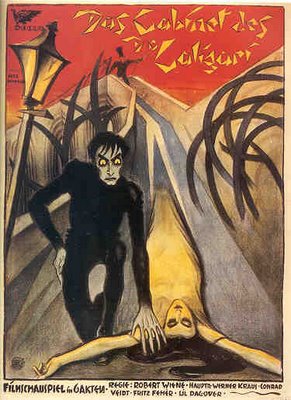Tuesday, October 31, 2006
A Few Other Things I Watched Recently
I also watched a documentary on a documentarian Stan Brakhage, quite an interesting fellow. Kind of the John Cage of the movies. (Note: If you either don't know who John Cage is, or if you do and you can't abide him, you might want to take a pass on Brakhage. Just a guess.) Here's a quote attributed to him in a profile from the late 60s/early 70s, explaining why he used 8 mm film (which at the time was affordable enough for film buffs to keep at home): A man could own his films, and live with them, showing them when he wanted to see them, examining them bit by bit, the way one can look at a painting until he knew the work. Until it was no longer something esoteric, but something familiar and beloved. That's awesome! Brakhage died in 2003; I'm glad he at least got to see a glimpse of the popularity of the Internet and DVDs. That sentiment reminds me of a Norman Lebrecht article I blogged about last year, which I agreed with for the most part but also took to account on a couple things. Lebrecht excerpt: What this means, in cultural terms, is that film now takes its place beside literature, music and visual imagery as an art that can be owned and bookmarked. Where once you had to visit a cinema or spool through half a mile of clunky videotape in order to access a seminal scene in an essential movie, you now zone into it on DVD as quickly as finding a name in the index of an artist biography. Film has become fact on DVD. It has left the cinema and joined us for drinks, an emancipatory moment for the last of the great western art forms. Books and music have always furnished our rooms, but to have film as a point of home reference, like Oxford English Dictionary and the complete works of Shakespeare, signals a revolution in cultural reception and, inevitably, creation. Much more on Stan Brakhage here, including lots of enlargements of still frames.
Lastly, New York Doll is an interesting and sometimes poignant profile of one of the founders of glam/punk rock who went on to substance abuse (no!), bankruptcy/homelessness, and finally a seemingly contented life as a Mormon geneology librarian. Arthur "Killer" Kane was one of the founders of the New York Dolls, whose work stands with that of Iggy and the Stooges, Bowie as Ziggy, the Ramones, and a few others as paving the way for the punk, glam, gender-bender anarchy of the 70s and early 80s. (For certain bands, that is. That same era produced Air Supply and Foreigner -- Nothing against Foreigner, by the way.)
Long story short, Kane (no relation) got in way over his head when he was 19, had a few years of intense attention and hedonism, followed by about 15 or so years of the gutter, followed by about another 15 or so as a public-transit riding member of the Church of Jesus Christ of Latter-Day Saints. The movie has a lot of good interviews with his rock colleagues and his Mormon friends, and shows his participation in the NYD reunion show put on by Morrissey. The end is kind of sad (spoiler: he dies) but these two nice ladies that worked with him at the LDS library put things in perspective. If you are interested in the non-classic-rock scene, check this out.

Pick the future Mormon.
Labels: Arthur Kane, Dog Day Afternoon, Inside Man, Movies, New York Dolls, Spike Lee, Stan Brakhage
Saturday, October 28, 2006
Office Coming Along; 101MIPWNL Updates; TV Streaming; GooTube; Spike Lee Movie; Dilbert Creator Fixes Own Brain
A few things:
- I've been updating my post on the 101MIPWNL with some links and comments. Before I'm done, I also intend (for those listees of mine also listed by Karlan, Lazar, and Salter) to parenthesize their rankings of each overlapped listee. Interesting Google find while doing a little research about this -- It's already been done. The Fictional 100: A Ranking of the Most Influential Characters in World Literature and Legend by Lucy Pollard-Gott bcame out back in 1998. Here's the official site. Among her other work: Finding fractal patterns in poetry.
- Get it while it lasts... Episodes of TV shows coming out the yingyang -- Not always everything from a given series, but tons of X-Files, Band of Brothers, Seinfeld, 24, Batman Beyond, and many many more.
- Annalee Newitz says that GooTube is dead. She says this in an article called "GooTube is Dead," in which the "I" in "Is" should be capped but is not. Excerpt: Another possible reason why Google bought YouTube is because it fits with the company's copyright reformist agenda. Google has already been testing the limits of corporate activism in the copy wars with its frankly awesome Google Book Search. This controversial project, which led to a lot of legal chest-thumping in the publishing industry, allows people to search the full text of thousands of books. Maybe YouTube will be a kind of Google Book for movies, with fully-searchable videos that allow artists, students, and film geeks to appreciate the motion picture in a whole new way.
- We watched the Spike Lee Joint Inside Man tonight. Not bad! Somewhat implausible, but it kept you thinking the whole time. I'm probably going to listen to the director's commentary tomorrow.
- Dilbert creator Scott Adams has successfully rewired his own brain!
Labels: Books, Dilbert, Google, Lists, Organizing, Spike Lee, TV, YouTube
Monday, October 23, 2006
"The Departed" Is Excellent!
 Speaking of coffins, they needed plenty of them in The Departed, which we just saw last night. I must say, this movie wasn't awesome, it was fucking awesome. Lots of cops, lots of bad guys. Lots of cops who are also bad guys. The only Italian-American gentlemen were dispatched with quickly, and the most of the surnamic vowels were followed by apostrophes.
Speaking of coffins, they needed plenty of them in The Departed, which we just saw last night. I must say, this movie wasn't awesome, it was fucking awesome. Lots of cops, lots of bad guys. Lots of cops who are also bad guys. The only Italian-American gentlemen were dispatched with quickly, and the most of the surnamic vowels were followed by apostrophes. Ghanaian Fantasy Coffins


- BBC photo essay on coffin makers.
- Book on Ghanian coffins.
- NPR feature story.
- Death online.
- National Museum of Funeral History.
- Washington Post story. Excerpt: The Norteys (the family of the departed) sought the services of Joseph Tetteh, who has become world famous crafting designer coffins. It is not uncommon for foreign tourists to stop by his workshop and buy them. Two years ago former president Jimmy Carter visited his shop and bought three: an eagle, a fish and a bell pepper. Tetteh, one of several makers of custom coffins in the Accra area, has made attention to detail his trademark. As he prepared Holala's four-door wooden Mercedes, he included windshield wipers, rearview and side-view mirrors (with real glass), an antenna (apparently taken from a radio), a Mercedes-Benz emblem on the hood, exhaust pipe, reflectors and tags (GG7155).


Labels: Africa, Art, Coffins, Documentaries, Ghana
Saturday, October 21, 2006
Saturday Stuff
- Here's a site with every Seinfeld script.
- Blog about Wikipedia.
- A very thorough Gilbert & Sullivan fan page. We had to learn the "To Sit in Solemn Silence" passage in college, and my friend Glenn and I can still recite it at a rapid clip.
Labels: Gilbert/Sullivan, Seinfeld, Wikipedia
Friday, October 20, 2006
101 Most Influential People Who Never Lived
The other day at the lunch table at work, a friend of mine mentioned a new book coming out that listed the 101 most influential people who never lived -- that is, mythical figures, fictional characters, anthropomorphizations, etc. who have impacted the rest of us either by virtue of their archetypal natures, or as a reflection of the innovation of their creator(s). This set us to thinking about what 101 figures each of us would pick, and so we agreed to avoid trying to learn what the actual book contained, avoid excessive discussion of potentials with each other, and list our own choices. There were 20 names on the list that were known to us due to their being discussed in the radio interview that sparked this discussion; those 20 (which I am told are in the book) are alphabetically listed first below. The other 81 (my choices) are listed alphabetically after that.
A couple of issues:
- Do you count Romeo & Juliet as one choice or two? I went with one.
- Do you include biblical figures? I think that Jesus, Paul, Peter, et al. were historical figures. I don't have as much faith in Job's actual existence. So, in that grey area, I picked some archetypal biblical characters who may or may not have lived.
- What do you do about, say, Mars and Ares? Is the Roman version of a Greek god the same character or a different character? I generally went with them being the same, although I did list both Zeus and Odin. If Odin can be Norway's contribution to this list, then that's just how it is. If you don't like it, make your own list.
Now I know that these choices are Western-centric (specifically America-centric) and focus a lot on the 20th Century. Well, guess what? Those are the country and century in which I was born. Not only that, but there are a lot more people around now to be influenced as compared to the 16th Century or something, and we are all a lot more connected to each other now than our ancestors were, so ideas flow throughout the world a lot more efficiently now than they ever have in the past. (Speaking of which, feel free to comment.)
Hyperlinks and rationales to follow as needed in updates; I reserve the right to substitute names onto a revised list, although the names given below will stay here for reference.So, my list: (Well, #s 21-101, anyhow.)
- Barbie (Here through Tarzan are the ones that we heard were on the list before we decided to make our own.)
- Betty Boop
- Big Brother
- Citizen Kane
- Dracula
- Ebenezer Scrooge
- Hercules
- Icarus
- James Bond
- King Arthur
- King Kong
- Loch Ness Monster
- The Marlboro Man
- Paul Bunyan
- Peter Pan
- Prince Charming
- Rosie the Riveter
- Santa Claus
- Siegfried
- St. Valentine
- Tarzan (My picks start on the next line.)
- Adam/Eve -- I have to say, they're pretty influential. Who do you think Commander Adama was named after?
- Agamemnon
- Alfred E. Neumann
- Alice
- Anansi
- Archie Bunker --An Archietypal figure.
- Beowulf
- Betty Crocker
- Big Bird -- One of the only American Sesame Street characters to be in many of the overseas Sesame shows as well.
- Cain/Abel
- Capt. Ahab -- OCD poster boy.
- Carmen
- Charlie Brown
- Christian (From Pilgrim's Progress)
- Clippit -- Taught how many millions of people how to organize and present information more efficiently?
- Col. Blimp -- Personification of British stiff-upper-lippedness.
- D'Artagnan
- Darth Vader
- Davey Jones
- Don Quixote -- Has a commonly used adjective made from his last name.
- Dr. Frankenstein/Prometheus
- Faust -- Excerpt: The German-speaking people saw Goethe’s Faust character as a reflection of themselves as well as a reflection of the life of their emerging hero Goethe. "Over time, the term Faustian and Faustian Man became widely used in the German culture to represent a person who was prepared to "defy morality, society and religion and to enter a pact with the devil" to achieve his desires (Dabezies 433). Today however there is still disagreement as to whether the term’s meaning is positive or negative – i.e. does it mean becoming dissatisfied with the limited nature of human knowledge and then selling one’s soul to the devil in exchange for worldly experience and power or does it suggest striving for knowledge, mastery and higher spiritual satisfaction (Webster's Third International Dictionary).
- Figaro
- G.I. Joe -- Not just the action figure!
- Gertie the Dinosaur
- Gilgamesh
- Gloria Saunders
- The Golem/Frankenstein's Monster
- The Good Samaritan
- HAL
- Hamlet
- Hawkeye (Natty Bumppo) -- First protagonist of major American novels.
- Helen of Troy
- His Master (RCA) -- Anything that revolutionizes communications and upsets the existing order gets on the list. Why? Influential by definition.
- Homer/Bart Simpson -- Remember when there were only three national broadcast networks?
- Huck Finn
- Jim Crow -- Excerpt: The term "Jim Crow" originated in a song performed by Daddy Rice, a white minstrel show entertainer in the 1830s. Rice covered his face with charcoal paste or burnt cork to resemble a black man, and then sang and danced a routine in caricature of a silly black person. By the 1850s, this Jim Crow character, one of several stereotypical images of black inferiority in the nation's popular culture, was a standard act in the minstrel shows of the day. How it became a term synonymous with the brutal segregation and disfranchisement of African Americans in the late nineteenth-century is unclear. What is clear, however, is that by 1900, the term was generally identified with those racist laws and actions that deprived African Americans of their civil rights by defining blacks as inferior to whites, as members of a caste of subordinate people.
- Job
- John Henry
- Johnny Appleseed -- Oops! A real guy...
- Johnny B. Goode
- Jonah
- Lady Justice
- Lucy Ricardo
- Macbeth
- Mickey Mouse
- The Missing Link -- Without the Missing Link, how would there have been a Flying Spaghetti Monster?
- Mother Nature
- Mr. Tibbs -- White audiences accustomed to Eddie 'Rochester' Anderson scampering around now had to contend with a black man with a badge and a gun who was accustomed to being addressed as "Mister."
- Norman Bates
- Odin
- Odysseus
- Oedipus
- Osiris
- Othello
- Pac-Man -- All those quarters must have represented a lot of R&D $$$ going into computer graphics. Excerpt: "This was the first time a player took on a persona in the game. Instead of controlling inanimate objects like tanks, paddles and missile bases, players now controlled a `living' creature," says Leonard Herman, author of Phoenix: The Rise and Fall of Videogames. "It was something that people could identify, like a hero."
- Phileas Fogg -- Made the world shrink.
- Poor Richard
- Robin Hood -- The basis for the entire philosophy of Marxism. Later to be emulated by the Russians, the Democratic Party, the Chinese, and then finally the Republican Party.
- Robinson Crusoe
- Romeo/Juliet
- Romulus/Remus
- Ronald McDonald -- Billions served.
- The Sandman
- Sen. Jefferson Smith -- How many people you know shake their heads/think it's hysterical/don't get it when they show a member of the Senate or House talking to an empty chamber on C-Span?
- Sgt. Pepper
- Sherlock Holmes
- Sinbad
- Snow White
- Superman
- Sweet Georgia Brown
- The Boogeyman (Oops - Should be under "B")
- Tintin
- Tom Sawyer
- Uncle Sam
- Uncle Tom
- Vito Corleone
- Yankee Doodle
- The Yellow Kid -- The first major comic-strip character. Had he been called "The Purple Kid," Hearst and Pulitzer might have been known for "Purple Journalism."
- Zeus

They're all more influential than you, and they aren't even real.
Update: OK, here is the list that the book's authors came up with. (The authors, btw, are Dan Karlan, Allan Lazar, and Jeremy Salter -- Here's their website.) USA Today article here, USA Today's PopCandy blogpost here. As I mentioned, further enhancements of this post are forthcoming.
Labels: Fictional Characters, Lists, Time-Wasters
Monday, October 16, 2006
Good (Short) Film on Afro-Brazilian Music

Labels: David Byrne, Documentaries, World Music
Lots of Movies on Google Video

Hey! There's a ton of great movies (mostly public domain) you can watch for free on Google Video. Some of these things I had spent years in the early 90s scouring the county's video stores and libraries for.
Ghostbusters (Might not last long?)
Akira Kurosawa's Rashomon Update: Here's Rashomon with English subtitles (oops!) and also AK's first film, Sugata Sanshiro (also subtitled). Props to Vili Maunula at the Akira Kurosawa News and Information Blog.
The 1915 German expressionist film The Golem
The 1920 German expressionist film The Cabinet of Dr. Caligari (J.C. Loophole watches this every Halloween.)
The 1922 German expressionist film Nosferatu
The 1916 adaptation of 20,000 Leagues Under the Sea
The 1925 adaptation of A.C. Doyle's The Lost World
The 1962 Russian documentary film The Great Battle on the Volga, which used Soviet combat footage from the Battle of Stalingrad.


Labels: Cinema, Documentaries, Film, Google, Kurosawa
Sunday, October 15, 2006
Get 'Em While They Last...
- The Devil and Daniel Johnston (MRQE) (The guy is pretty nutty, but, you know these artists...)
- Who Killed the Electric Car? (MRQE) (These people are pretty nutty, but, you know these treehuggers...)
Labels: Daniel Johnston, Documentaries, Electric Car, Movies
Speaking of GOP Senators Saying Stupid Shit...

Mr. Burns is the incumbent, and is up for re-election next month. As you can imagine, his opponent wants to make sure that everyone in Montana knows about his lack of tact. But what about a political commercial (i.e., political speech) that involves profanity? This is a great example of why the fucking FCC is so anti-American and anti-free speech. Excerpt from the Helena Independent Record: A television commercial slamming Sen. Conrad Burns for cursing at a firefighting crew could be too vulgar for broadcast television, the Montana Broadcasters Association is warning its members. Citing the Federal Communications Commission’s ‘‘current stance on indecent language,’’ association President Greg MacDonald advised stations Wednesday to pull the spot or check with attorneys before airing it. ‘‘While we have no idea how the commission might come down on such language in a political spot, we also don’t want to test the waters at $325,000 per violation,’’ MacDonald wrote. The commercial, paid for by the Democratic Senate Campaign Committee, opens with a cautionary note: ‘‘The following contains language by Conrad Burns unsuitable for Montana.’’ The narrator begins by praising firefighters as heroes, then switches to quotes from reports of a confrontation Burns had with firefighters in July while waiting for a flight at the Billings airport. ‘‘But Conrad Burns said they had done, quote, ‘a piss poor job,’ and while pointing at one, ‘he hasn’t done a Goddamned thing,’ ’’ the announcer says. The quotes are based on a report filed by a state official who was sent to the airport to talk with Burns after he confronted the Virginia firefighting team.
What a bunch of bullshit! And all this over some Howard Stern jokes and one (not even both!) of Janet Jackson's boobs! Looks like the First Amendment gets trumped by obscenity fears... At least the children of Montana will be safe.
BTW, here's the commercial in question (I think):
Labels: Censorship, Conrad Burns, FCC, First Amendment, Profanity, Senate
CV:NSM 3&4
Labels: Chad Vader
Saturday, October 14, 2006
School of Rick
Paul Green School of Rock; Albert Cullum School of... (Note to Self: Think of Appropriate Word Play)
Mr. Green was quite in-your-face and abrasive (The ♥G♥ called him a bad name) and very much drove his young rockers to perfectionism, often through F-word-fueled insults. In some cases this seemed to work OK, but I bet it'd get old after a while if you were on the receiving end. He reminded me a lot of the stereotype of the intense, win-at-any-cost football coach. (Not the one played by the Denzel Washington type of character either, but the dictator that the Denzellish character's team always beats for a feel-good ending.) How much of that was real, and how much was him putting on a persona for the camera? One of my favorite quotes (not verbatim, but close), as he gave his students a pep talk right before their first big rock performance (Black Sabbath-themed): "Remember, tonight is not about me. Tonight is not about you. Tonight is not even about music. Tonight is all about Satan!" Why didn't I ever have any teachers that said that?!? In any case, he ended up with some pretty awesome young rock musicians, including a bunch that went to Germany to play at a Frank Zappa Festival. Here's a clip of a 12-year-old PGSOR virtuoso named C.J. Tywoniak covering the Van Halen cover of "You Really Got Me":
Mr. Cullum, on the other hand, was more likely to dress up like a Grizzly Bear and chase his students across a giant map of the United States painted on the playground blacktop. (At least, we assume he was more likely to do this -- If he dropped any F-bombs or paeans to Satan on his 6th-graders, they didn't include it in this doc. Maybe it's on the cutting room floor.)
Cullum had the idea of teaching the classics (Shakespeare, Greeks, Romans, et al.) in his elementary school, getting the students to put on performances for the rest of the school and community, and ended up getting a 29-year-old Robert Downey Senior to put some of these on film. CBS took an interest, and gave Mr. Cullum's work some exposure on one of their interview shows. The film is told through cutting in this footage with modern-day footage of some of the former students, now in their 40s and 50s, returning to their old school to visit with their now-retired teacher.
I liked both of these films, because they profiled people who were different, and that always scores points with me.
Labels: Cullum, Documentaries, Esquith, Rock Music, Shakespeare, Teachers
Thursday, October 12, 2006
Wiki/MLA Question; 6000 Books; Grindhouse; Statistics; Barenboim; 9/11 Conspiracies Addressed; Tower Tail
- In an odd mashup of algorithms, I am now Google hit #3 for the phrase (no quotes) "Is wikipedia counted as MLA research." My answer -- YTF not? As long as you're there, please contribute to the appropriate Wiki page. And, if you happen to be visiting China while doing your research, you're in luck!
- Here are some ideas about what to do with the 6000 books in your home.
- Tarantino and Rodriguez have their new trailer ready for Grind House/Grindhouse. Kickass! Update: Looks like this got pulled from YouTube (why on earth is everyone so afraid of free advertising?) but it's also on Google Video. (Don't tell me PopCultureShock has some kind of exclusivity...) Anyhow, here are some GH cast interviews too.
- Currently watching the 24-part series Meaning From Data: Statistics Made Clear.
- Lots of articles by and interviews with Daniel Barenboim.
- Chris Anderson on the fall of Tower Records.
Labels: Books, Google, Grind House, Long Tail, Movies, Music, Rodriguez, Statistics, Tarantino, Wikipedia
First Two Eps of Dexter Free (?)

Wednesday, October 11, 2006
Suggestions for Newspapers; S-Rock Rocks; GooTube and Goofice Suite; BBB
- Doc Searls has 10 ideas for newspapers to succeed in the age of the Internet. Excerpt: First, stop giving away the news and charging for the olds. Okay, give away the news, if you have to, on your website. There's advertising money there. But please, open up the archives. Stop putting tomorrow's fishwrap behind paywalls. Writers hate it. Readers hate it. Worst of all, Google and Yahoo and Technorati and Icerocket and all your other search engines ignore it. Today we see the networked world through search engines. Hiding your archives behind a paywall makes your part of the world completely invisilble. If you open the archives, and make them crawlable by search engine spiders, your authority in your commmunity will increase immeasurably. Plus, you'll open all that inventory to advertising possibilities. And I'll betcha you'll make more money with advertising than you ever made selling stale editorial to readers who hate paying for it. (And please, let's not talk about Times Select. Your paper's not the NY Times, and the jury is waaay out on that thing.)
- Schoolhouse Rock! -- Where Are They Now? Excerpt: Ezra Mohawk stands out as the rebel rocker in the group, having performed with everyone from Frank Zappa to Jerry Garcia. She also represents all the singers who might have worked on just one or two of the Schoolhouse songs. There was Verb, That's What's Happening, by Zach Sanders, Elbow Room by Sue Manchester, and a few others, But Liz is the only person I could find anything on, so she's the spokesperson by default, and a damn good one, as Interjections is a classic. Note: If you like Schoolhouse Rock! when it rocks, be sure to check out Schoolhouse Rock! Rocks!
- Looks like in addition to the YouTube business, Google now wants to get into the Excel business. I'm sure the jury will be out for a little while. Maybe I'll play around with it this weekend.
- I've been enjoying the Boing Boing podcasts. Their podcast show is named "Boing Boing Boing." I kind of wish they had picked "Boing Boing Bone (Bawn)."
Labels: Boing Boing, Google, Internet, Newspapers, Schoolhouse Rock
Tuesday, October 10, 2006
Kablooey!
Labels: Battlestar Galactica, Jon Stewart, South Park
Monday, October 09, 2006
Kanye Mahna
Wikipedia entry here; Original Muppet version below:
Now, interesting fact: This song originally appeared in a quaint Swedish film from the late 60s, the soundtrack albums of which are shown below:


Sunday, October 08, 2006
What I've Been Reading/Listening to/Watching Lately
- The Pulitzer-winning Hirohito and the Making of Modern Japan by Herbert P. Bix. I'm about 80 pages into it (out of about 700). So far so good! Comments and/or excerpts to follow. Here's a paper drawn from the book; Reviews here and here. Post-Pulitzer NewsHour interview w/Prof. Bix here.
- During my commute this past week, I've been listening to a engrossing audiobook called The Zero by a guy named Jess Walter. The Zero refers to Ground Zero (as in the WTC-attack site). The protagonist of this (absurdist?) novel is a Yossarianesque NYPD officer during the days and weeks immediately following the attack. (The terms "World Trade Center," "Al Qaeda," "9/11," and maybe some others have not been uttered in the chunk of the book I have listened to so far.) Again, so far so good! Check it out in print or on audio if you get a chance.
- I watched all of Battlestar Galactica Season 2.5 last week. I have tentatively decided to forgo watching any of the third season shows (which started Friday) until they either come out on DVD or I can find some bootlegs on the Web. JMPP has a good roundup on the political themes from Friday's premiere. Frakking awesome!
- Right now we're sitting in bed watching What the Bleep Do We Know!?. At least I think we are. And I think this thing is a bed. And I think now is now. The MRQEers gave it some pretty crummy reviews. That's not necessarily bad, because maybe the reviewers don't exist. Anyhow, I didn't realize until partway through the DVD that one of the primary interviewees is actually 11,000 years old! Roger Ebert excerpt: Among the experts on the screen, only one seemed to make perfect sense to me. This was a pretty, plumpish blond woman with clear blue eyes, who looked the camera straight in the eye, seemed wise and sane, and said that although the questions might be physical, the answers were likely to be metaphysical. Since we can't by definition understand life and the world, we might as well choose a useful way of pretending to. Sounded good to me, especially compared to the cheerful evasions, paradoxes and conundrums of the other experts. Only after the movie was over did I learn from my wife, who is informed on such matters, that the sane woman who made perfect sense was in fact Ramtha -- or, more precisely Ramtha as channeled by the psychic JZ Knight, who would seem to be quite distinctive enough without leaving the periods out of her name. And who is Ramtha? From Cathleen Falsani, the religion writer of the Sun-Times, I learn that Ramtha is a 35,000-year-old mystical sage from the lost continent of Atlantis. Well, weirder authorities have surfaced. Or maybe not. As I continue to watch, I begin to see how the thing got some bad reviews. One of the talking heads is this nutjob named John Hagelin who ran for president a few years ago on the ticket of the Natural Law Party. (I only know this from years of C-Span viewing; none of the interviewees have been identified so far.) This movie is worth watching if you are interested in movies that are different (which I am), but let me leave you with this comment from the Toronto Star: The film with the year's most unfortunate title also happens to be a candidate for the year's worst film. What The Bleep Do We Know!? is little more than a clumsy infomercial for a New Age pursuit called Ramtha's School of Enlightenment, RSE for short, which follows the teachings of an 11,000-year-old warrior as channelled by a 58-year-old New Mexico woman. The sect apparently holds quantum mechanics, metaphysics and bafflegab in equal esteem.
Labels: Battlestar Galactica, Books, Japan, Movies
Saturday, October 07, 2006
Trying Out Blogger Beta
 OK, so I just signed up for the beta version of Blogger. Once I see how it differs from the original, I'll comment further. Here are the known issues so far. (Hope I didn't jump into this too quick.)
OK, so I just signed up for the beta version of Blogger. Once I see how it differs from the original, I'll comment further. Here are the known issues so far. (Hope I didn't jump into this too quick.)Labels: Blogger, Diacritical Marks, Internet, Simpsons
Fathom Archive

This article led me to the eclectic Fathom Archive.
From its FAQ page: The History of Fathom -- Fathom Knowledge Network, founded in 1999, launched its Web site in the spring of 2000 with the goal of providing high quality educational resources to a global audience through the Internet. The Fathom academic consortium grew to include 14 leading educational and cultural institutions dedicated to that goal. The Fathom Web site ceased operations in March 2003. The Fathom Consortium consited of: The American Film Institute, the British Library, the British Museum, Cambridge University Press, Columbia University, the London School of Economics, the Natural History Museum, the New York Public Library, RAND, the Science Museum, the University of Chicago, the University of Michigan, the Victoria & Albert Museum, and the Woods Hole Oceanographic Institution.
The articles all looked very interesting, so why don't I just list them all here?
Ancient Egyptian Society and Family Life -- Emily Teeter and Douglas J. Brewer
Ancient Greek Curse Tablets -- Christopher A. Faraone
Ancient Greek Love Magic -- Christopher A. Faraone
Archaeology and National Identity in Israel -- Nadia Abu El-Haj
Assessing the Economic Impact of September 11 -- Gary Becker
Astrology in Ancient Rome: Poetry, Prophecy and Power -- David Wray
Athanasius Kircher and the Egyptian Oedipus -- Ingrid D. Rowland
The Biology of B-Movie Monsters -- Michael C. LaBarbera
Capital Punishment in the United States: A Forum on Death-Penalty Issues -- Randolph N. Stone, et al.
Capital Punishment Reform in Illinois -- Tracy Meares, et al.
Carnal Ignorance -- Wendy Doniger
Carnal Knowledge -- Wendy Doniger
Civil Rights and Military Tribunals -- Kenneth Adams, Herbert J. Stern, Geoffrey R. Stone, David Strauss
Clones, Genes and Faustian Technology -- Robert J. Richards
The Correspondence of Queen Elizabeth I and King James VI -- Janel Mueller
Creoles, Pidgins and the Evolution of Languages -- Salikoko S. Mufwene
Digital Media and the Egalitarian Classroom -- Candace Vogler
"Democracy Dies Behind Closed Doors": Civil Liberties and National Defense -- Nadine Strossen
Egil Skallagrimsson and the Viking Ideal -- Christina von Nolcken
Emotion, Rationality and Human Potential -- John Cacioppo
End-of-Life Decisions -- Tikva Frymer-Kensky, et al.
Equal Protection? The Supreme Court's Decision in Bush v. Gore -- Geoffrey R. Stone
Exhibiting Experimental Art in China -- Wu Hung
Family Values in Ancient Rome -- Richard Saller
Feminism, the Taliban and the Politics of Counterinsurgency -- Saba Mahmood, Charles Hirschkind
Fragmentation and Cybercascades -- Cass Sunstein
Hatshepsut: Wicked Stepmother or Joan of Arc? -- Peter F. Dorman
Hypocrisy about Hypocrisy: The Creation of Selves -- Wayne C. Booth
"I Have Given You my Advice": Educational Principles in the Hittite Empire -- Theo P.J. van den Hout
The Legitimacy of Military Tribunals -- Bernard Meltzer, David P. Currie, Jack Goldsmith, Cass Sunstein, and Adrian Vermeule
The Lessons of Enron -- Baird, Douglas; Daniel Fischel; Randal Picker; Julie Roin; David Weisbach
Lost Egypt: Photography and the Early Documentation of Egyptian Monument -- Epigraphic Survey
Lost Tongues and the Politics of Language Endangerment -- Salikoko S. Mufwene
Mapping Africa: Problems of Regional Definition and Colonial/National Boundaries -- Ralph A. Austen
Miles of Clay: Information Management in the Ancient Near Eastern Hittite Empire -- Theo P.J. van den Hout
Never Snitch: The Mythology of Harry Potter -- Wendy Doniger
Ordinary Evil -- Candace Vogler
The Origins of the Dead Sea Scrolls -- Norman Golb
The Persistent Puppet: Pinocchio's Heirs in Contemporary Fiction and Film -- Rebecca West
The Power of Tiananmen: Intellectual Activity and the Student Movement -- Dingxin Zhao
The Prophetic Art of Prognosis -- Nicholas A. Christakis
A Quixotic Museum: Cervantes and Italian Renaissance Art -- Frederick A. de Armas
Religion in the Lives of the Ancient Egyptians -- Emily Teeter and Douglas J. Brewer
The Rhetoric of Bush and Bin Laden -- Bruce Lincoln
The Rules of Comedy: Moliere and the Art of Depiction -- Larry F. Norman
The Scientific Article: From Galileo's New Science to the Human Genome -- Joseph E. Harmon
Shakespeare Faces Retirement -- David Bevington
Should We Continue to Study Race? -- Kenneth Warren
The Theatrical Baroque: European Plays, Painting and Poetry, 1575-1725 -- Larry F. Norman
Therapeutic Cloning: Hope or Hype? -- Janet D. Rowley
Toward Global Justice -- Martha Nussbaum
Turning the Century with Thomas Hardy -- James K. Chandler
Virtue and Virtuality: Gender in the Self-Representations of Queen Elizabeth I -- Janel Mueller
Why It Helps to Read Great Books: Texts, Society and Time -- Constantin Fasolt
Why We Dig Up the Past -- McGuire Gibson, Susan Kidwell, Paul Sereno
Women's Legal Rights in Ancient Egypt -- Janet H. Johnson
The Wrath of the Northmen: The Vikings and their Memory -- Christina von Nolcken
Friday, October 06, 2006
R.I.P. Cleopatra Jones
More on the great Cleopatra Jones films here, here, and here.

Ideas Sticking
There's a interesting-looking book coming out in a few months by two brothers named Chip and Dan Heath called Made to Stick: Why Some Ideas Survive and Others Die. Their blog is coming soon, and when it is up, it'll get sidebar consideration. Here's a paper that Chip (who is a professor at Stanford University) and two of his colleagues wrote several years ago for the Journal of Personality and Social Psychology, titled Emotional Selection in Memes: The Case of Urban Legends.
His abstract: We explore how much memes like urban legends succeed based on informational selection (i.e., truth or a moral lesson) and emotional selection (i.e., the ability to evoke emotions like anger, fear, or disgust). We focus on disgust because it is the least intuitive form of emotional selection and its elicitors have been precisely described. In Study 1, controlling for informational factors like truth, people were more willing to pass along stories that elicited stronger disgust. Study 2 randomly sampled legends and created versions that varied in disgust; people preferred to pass along versions that produced the highest level of disgust. In Study 3, we coded legends for individual story motifs that produce disgust (e.g., ingestion of a contaminated substance); legends that contained more disgust motifs were distributed more widely on urban legend web sites. We discuss implications of emotional selection for the social marketplace of ideas.
Also, here's something Prof. Heath and yet another colleague wrote discrediting the Mozart Effect.
Wednesday, October 04, 2006
Cut Off One Head...
Internet to the rescue!!
So, you can find every (I think...) Simpsons, Family Guy, American Dad, Futurama, and South Park episode on R*pe the Web.
LJ on teh Google
In just a decade, the evolution of the Internet has upset the balance in an information ecology that had served libraries for centuries. What will the next decade look like? Blogs and RSS feeds have changed the way we gather and look at news. Wikipedia, the living, free online encyclopedia that anyone can edit, is changing how we think about reference. Services offered by Amazon.com and NetFlix are winning the hearts, minds—and habits—of our users.
“All of these things,” Janes says, “are opportunities.” Libraries today, he observes, cannot affort to be paralyzed, wed to old modes of service, bureaucratically pinned-down, or too reticent to take advantage of the fact that, in a world drowning in information, libraries should be more vital than ever.
“Many librarians today don’t really know what they do best, so here they are concerned about competing in Google’s space instead of choosing to compete in what we do best,” Abram says. “That is creating context, learning, community, and improving the quality of the question.”
Also, props to Democratic Virgina Congressman Rick Boucher, LJ's 2006 Politician of the Year! Excerpt:
Early to recognize the incredible usefulness of the Internet and new technology to his constituents, Boucher was and is a visionary, seeing and solving problems and creating policy solutions as new technologies arrive. He has long been a friend and ally to libraries in the 9th District and the nation. He is one of the architects of federal law and policy on information technology, the Internet, copyright, and intellectual property and a formidable opponent of actions that threaten the access rights of libraries and users.
Boucher’s work to preserve the concept and extend the dimensions of “fair use” in copyright and to ensure that libraries and citizens can continue to have free access to all the riches of the Internet and the entire intellectual record have made him Library Journal’s 2006 Politician of the Year.
Tuesday, October 03, 2006
Google Home Page; TFG; A; Wikipedia Needs You; Netflix Needs You Too (and the pay is better)
- Washington Post article on the Google home page, among other things. (Hey -- they haven't really done any logo-redesigns-for-a-day lately, have they? Google, that is, not the Post. That's OK, cuz you can make your own.)
- All the episodes of Family Guy. Giggity-Giggity!
- Zigzaglineoscope readings of Neil "A"rmstrong's comments upon setting foot on the lunar surface.
- Know anything about Quakers in Latin America? How about E.E. Evans-Pritchard? Madame Blueberry? Cottage Cheese? The Irish Bruce Wars, 1315-1318? If so, they're all on the list of Wikipedia articles to be expanded.
- Netflix is offering a million bucks to anyone who can satisfactorily improve their recommendation software. I think it works OK, but if it's betterable, then hey! Criticism from Kevin Burton here.
Monday, October 02, 2006
A Few Things
- Here's a site on the study of human intelligence I found while Googling around for sites on TMC personalities.
- And, I found the copy of the Justice League cover below at a page devoted to chess in comic books.
- If you ever need a bunch of doodads to show people why they shouldn't smoke, this page is for you.
- Lots of nifty fonts to be found here.
- The George Allen Insult Generator. Sweet!
- Jay Parini writes about other people's home libraries. We finally got all the gray paint up on the side of the house this weekend, so hopefully it's just a matter of painting one room and I can get the remainder of my shelves up. Excerpt: One old friend, a classical scholar, has thousands of books, mostly in his field. When staying with him, I like to get up early and wander among his shelves, learning about the classical world by standing before his endless bookcases. The Greek and Roman writers, of course, are neatly arrayed, according to genre or period. It's interesting to see the elaborate commentaries at the bottom of the page (which often contain a hidden narrative, as Nabokov understood and put to good use in "Pale Fire," his witty novel in the form of a textual commentary), and it's useful to note the sort of scholarly work done in my friend's field. I still recall discovering "The Greeks and the Irrational," by E.R. Dodds: a staggeringly learned and stimulating book that I'd have probably not found except by accident. As a whole, this collection reflects a broadly educated mind of a kind rarely found these days, a person for whom history — and the humanities — are alive, even ablaze.












